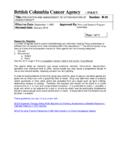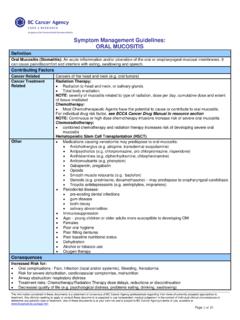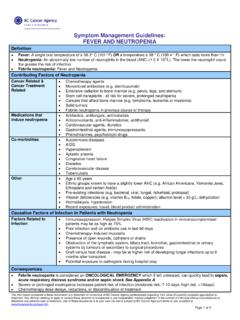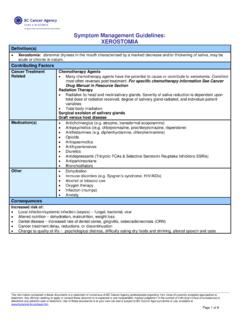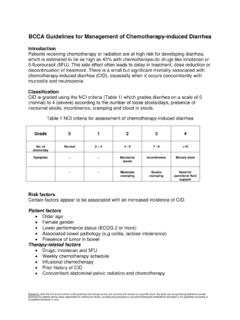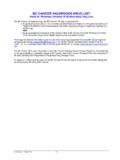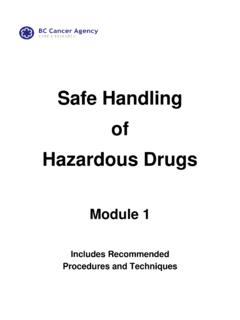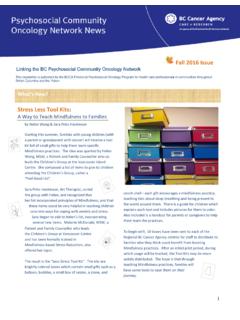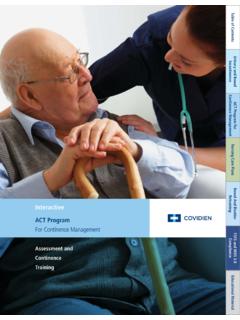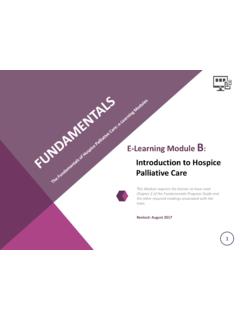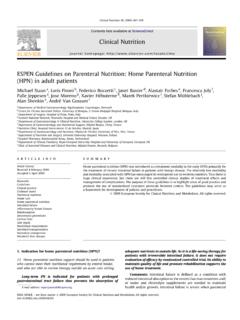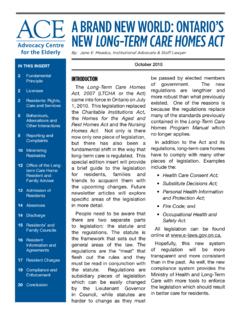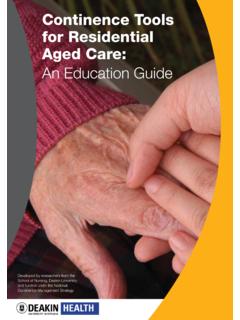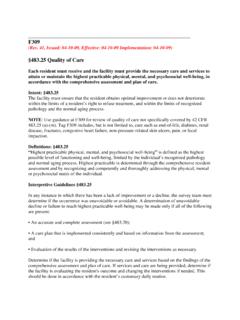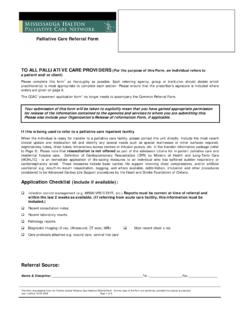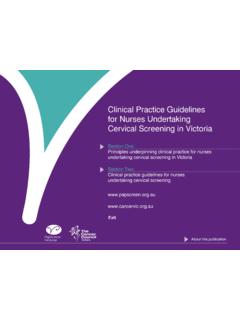Transcription of BC Cancer Protocol Summary for Treatment of Advanced Non ...
1 BC Cancer Protocol Summary for Treatment of Advanced Non-Small Cell Lung Cancer Using Pembrolizumab Protocol Code ULUAVPMB Tumour Group Lung Contact Physician Dr. Christopher Lee ELIGIBILITY: Advanced non-small cell lung Cancer Second- or subsequent-line therapy for disease progression on or after prior platinum-based chemotherapy Tumor characteristics confirmed by an accredited laboratory: PD-L1 expression > 1% ECOG 0-2 Adequate hepatic and renal function Access to a Treatment centre with expertise to manage immune-mediated adverse reactions of pembrolizumab Patients are eligible to receive either pembrolizumab or nivolumab, not both. BC Cancer Compassionate Access Program (CAP) approval must be obtained EXCLUSIONS: ECOG performance status > 2 Active, known or suspected autoimmune disease Use with caution in patients with long term immunosuppressive therapy or systemic corticosteroids (requiring more than 10 mg predniSONE/day or equivalent) TESTS: Baseline: CBC & differential, platelets, creatinine, alkaline phosphatase, ALT, total bilirubin, LDH, sodium, potassium, TSH, morning serum cortisol, chest x-ray C-reactive protein and albumin (optional, and results do not have to be available to proceed with first Treatment ) Before each Treatment : CBC & differential, platelets, creatinine, alkaline phosphatase, ALT, total bilirubin, LDH, sodium, potassium, TSH If clinically indicated.
2 Chest x-ray, morning serum cortisol, lipase, glucose, serum or urine HCG (required for women of child bearing potential if pregnancy suspected), free T3 and free T4, serum ACTH levels, testosterone, estradiol, FSH, LH, ECG Weekly telephone nursing assessment for signs and symptoms of side effects while on Treatment (Optional). BC Cancer Protocol Summary ULUAVPMB Page 1 of 10 Activate: 1 Feb 2018 Revised: Warning: The information contained in these documents are a statement of consensus of BC Cancer professionals regarding their views of currently accepted approaches to Treatment . Any clinician seeking to apply or consult these documents is expected to use independent medical judgement in the context of individual clinical circumstances to determine any patient's care or Treatment . Use of these documents is at your own risk and is subject to BC Cancer 's terms of use available at PREMEDICATIONS: Antiemetics are not usually required If required, antiemetic Protocol for low emetogenicity (see SCNAUSEA) If prior infusion reactions to pembrolizumab: diphenhydrAMINE 50 mg PO, acetaminophen 325 to 1000 mg PO, and hydrocortisone 25 mg IV 30 minutes prior to Treatment Treatment : Drug Dose BC Cancer Administration Guideline pembrolizumab 2 mg/kg (maximum 200mg) IV in 50 mL NS* over 30 minutes Using a to micron in-line filter *Keep final concentration to 1 to 10 mg/mL Repeat every 3 weeks until disease progression, unacceptable toxicity, or a maximum of 35 cycles or 2 years of Treatment DOSE MODIFICATIONS: No specific dose modifications.
3 Toxicity managed by Treatment delay and other measures (see Appendix for Immune-mediated Adverse Reaction Management Guide). PRECAUTIONS: 1. Serious immune-mediated reactions: can be severe to fatal and usually occur during the Treatment course, but may develop months after discontinuation of therapy. They may include enterocolitis, intestinal perforation or hemorrhage, hepatitis, dermatitis, neuropathy, endocrinopathy, pneumonitis, as well as toxicities in other organ systems. Early diagnosis and appropriate management are essential to minimize life-threatening complications (see Appendix for Immune-mediated Adverse Reaction Management Guide). 2. Infusion-related reactions: isolated cases of severe infusion reactions have been reported. Discontinue pembrolizumab with Grade 3 or 4 reactions. Patients with mild or moderate infusion reactions may receive pembrolizumab with close monitoring and use of premedication.
4 Contact Dr. Christopher Lee or tumour group delegate at (604) 877-6000 or 1-800-663-3333 with any problems or questions regarding this Treatment program. BC Cancer Protocol Summary ULUAVPMB Page 2 of 10 Activate: 1 Feb 2018 Revised: Warning: The information contained in these documents are a statement of consensus of BC Cancer professionals regarding their views of currently accepted approaches to Treatment . Any clinician seeking to apply or consult these documents is expected to use independent medical judgement in the context of individual clinical circumstances to determine any patient's care or Treatment . Use of these documents is at your own risk and is subject to BC Cancer 's terms of use available at REFERENCES: 1. Herbst RS, Baas P, Kim D-W, et al. Pembrolizumab versus docetaxel for previously treated, PD-L1-positive, Advanced non-small cell lung Cancer (KEYNOTE-010): a randomised controlled trial.
5 The ;387(10027):1540-1550. 2. Garon EB, Rizvi NA, Hui R, et al. Pembrolizumab for the Treatment of Non-Small Cell Lung Cancer . N Engl J ;372(21):2018-2028. 3. Merck Canada: KEYTRUDA (pembrolizumab) product monograph. Kirkland, Quebec: 15 April 2016. 4. Postow M, Wolchok J. Toxicities Associated With Checkpoint Inhibitor Immunotherapy. UpToDate revised 2015. Accessed: , May 2016. 5. Weber JS, et al. Management of Adverse Events Following Treatment with Anti-Programmed Death-1 Agents. Oncologist 2016; 21 Cancer Protocol Summary ULUAVPMB Page 3 of 10 Activate: 1 Feb 2018 Revised: Warning: The information contained in these documents are a statement of consensus of BC Cancer professionals regarding their views of currently accepted approaches to Treatment . Any clinician seeking to apply or consult these documents is expected to use independent medical judgement in the context of individual clinical circumstances to determine any patient's care or Treatment .
6 Use of these documents is at your own risk and is subject to BC Cancer 's terms of use available at Appendix. Immune-mediated adverse reaction management guide Pneumonitis Monitoring Radiographic changes, new or worsening cough, chest pain, shortness of breath Grade 2 Mild to moderate symptoms, worsens from baseline Physician notified and collaborative symptom management initiated Withhold pembrolizumab Consider high resolution CT scan Monitor daily predniSONE 1 mg/kg/day PO Patient education of steroid use Pulmonary and infectious disease consultation Consider bronchoscopy, lung biopsy Book nursing follow up call as needed Grade 3 or 4 Severe symptoms, new or worsening hypoxia, life-threatening Grade 1 Radiographic changes only Physician notified of assessment Consider withholding pembrolizumab Monitor every 2 to 3 days Consider pulmonary and infectious disease consultation Reassess at least every 3 weeks If improved Resume pembrolizumab (if withheld)
7 When stable If worsens Treat as Grade 2 or Grades 3 or 4 Reassess every 1 to 3 days If improved to baseline Taper steroid over at least 1 month BEFORE resuming pembrolizumab Consider prophylactic antibiotics for opportunistic infections If persists or worsens after 2 weeks Treat as Grades 3 or 4 Hospitalize Discontinue pembrolizumab Monitor daily predniSONE 2 to 4 mg/kg/day PO Patient education of steroid use Prophylactic antibiotics for opportunistic infections Pulmonary and infectious disease consultation Consider bronchoscopy, lung biopsy Upon discharge, book nursing follow up call as needed If improved to baseline Taper steroid over at least 6 weeks If persists or worsens after 2 days Consider non-steroid immunosuppressive agents ( , inFLIX ximab, cyclophosphamide, mycophenolate) BC Cancer Protocol Summary ULUAVPMB Page 4 of 10 Activate: 1 Feb 2018 Revised: Warning: The information contained in these documents are a statement of consensus of BC Cancer professionals regarding their views of currently accepted approaches to Treatment .
8 Any clinician seeking to apply or consult these documents is expected to use independent medical judgement in the context of individual clinical circumstances to determine any patient's care or Treatment . Use of these documents is at your own risk and is subject to BC Cancer 's terms of use available at Enterocolitis Monitoring Diarrhea, abdominal pain, mucus or blood in stools-with or without fever, ileus, peritoneal signs Grade 2 Diarrhea of 4 to 6 stools per day over baseline, IV fluids less than 24 h , normal daily activities, abdominal pain, mucus or blood in stool, Physician notified and collaborative symptom management initiated Withhold pembrolizumab Antidiarrheal Treatment If persists beyond 3-5 days or recur, start predniSONE to 1 mg/kg/day PO Patient education of steroid use Nursing management per BC Cancer Symptom Management Guidelines: Cancer -Related Diarrhea Book nursing follow up call as needed Improvement to Grade 1 or less Resume pembrolizumab If steroid used, taper over at least 1 month BEFORE resuming pembrolizumab Consider prophylactic antibiotics for opportunistic infections Patient education of steroid tapering per physician order Grade 3 or 4 Grade 3: diarrhea of 7 or more stools per day over baseline, incontinence, IV fluids for 24 h or more, impaired daily activities; colitis with severe abdominal pain, requiring medical interventions, peritoneal signs of bowel perforation Grade 4: life-threatening colitis, perforation Grade 1 Diarrhea of less than 4 stools per day over baseline.
9 Asymptomatic colitis Physician notified of assessment Nursing management per BC Cancer Symptom Management Guidelines: Cancer -Related Diarrhea Antidiarrheal Treatment Book nursing follow up call for next business day and/or create care plan if BC Cancer nurse unable to follow up Improvement to Grade 1 or less Taper predniSONE over at least 1 month before resuming pembrolizumab Patient education of steroid tapering per physician order If no response within 5 days or recur Consider Treatment with inFLIX imab; if refractory to inFLIX imab, consider mycophenolate Continually evaluate for evidence of gastrointestinal perforation or peritonitis Consider repeat endoscopy Physician notified and collaborative symptom management initiated Withhold (if Grade 3) or discontinue (if Grade 4 or persistent Grade 3) pembrolizumab Gastroenterology consultation Rule out bowel perforation; if bowel perforation is present, DO NOT administer corticosteroids Consider endoscopic evaluation predniSONE 1 to 2 mg/kg/day PO Prophylactic antibiotics for opportunistic infections Patient education of steroid use Nursing management per BC Cancer Symptom Management Guidelines: Cancer -Related Diarrhea BC Cancer Protocol Summary ULUAVPMB Page 5 of 10 Activate: 1 Feb 2018 Revised: Warning: The information contained in these documents are a statement of consensus of BC Cancer professionals regarding their views of currently accepted approaches to Treatment .
10 Any clinician seeking to apply or consult these documents is expected to use independent medical judgement in the context of individual clinical circumstances to determine any patient's care or Treatment . Use of these documents is at your own risk and is subject to BC Cancer 's terms of use available at Monitoring Abnormal liver function test, jaundice, tiredness Grade 2 AST/ALT 3 to less than 5 X ULN or Total bilirubin to 3 X ULN Physician notified and collaborative symptom management initiated Withhold pembrolizumab Rule out infectious or malignant causes or obstruction Increase LFTs monitoring to every 3 days until resolution Book future nursing follow up call as needed If AST/ALT 3 ULN or lower and bilirubin ULN or lower, or return to baseline Resume pembrolizumab If elevation persists more than 5-7 days or worsen predniSONE to 1 mg/kg/day PO consider prophylactic antibiotics for opportunistic infections taper predniSONE over at least 1 month before resuming pembrolizumab Patient education of steroid tapering per physician order Grades 3 or 4 AST/ALT more than 5 X ULN or Total bilirubin more than 3 X ULN or AST/ALT increases 50% baseline and lasts 1 week in patients with liver metastasis who begin Treatment with Grade 2 elevation of AST/ALT Physician notified and collaborative symptom management initiated Discontinue pembrolizumab Rule out infectious or malignant causes or obstruction Increase LFTs monitoring to every 1 to 2 days until resolution Gastroenterology consultation predniSONE 1 to 2 mg/kg/day PO Prophylactic antibiotics for opportunistic infections Patient education on steroid
